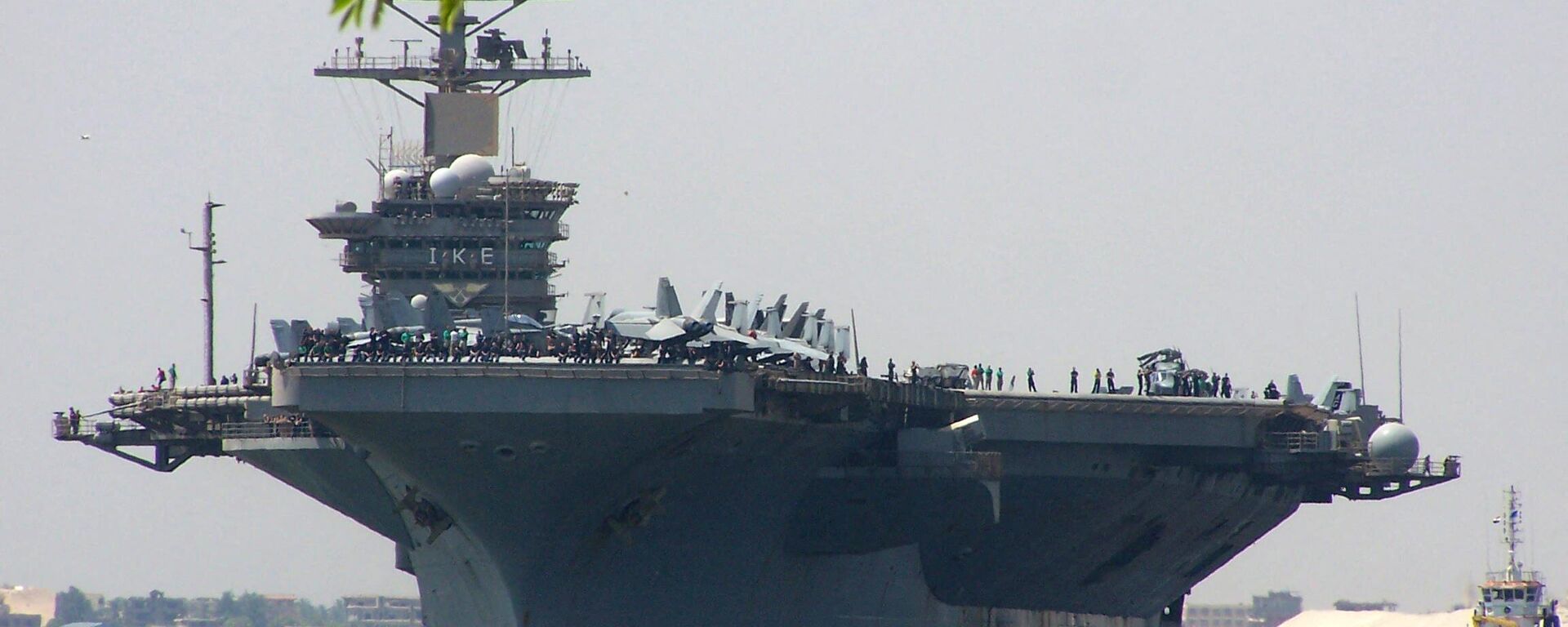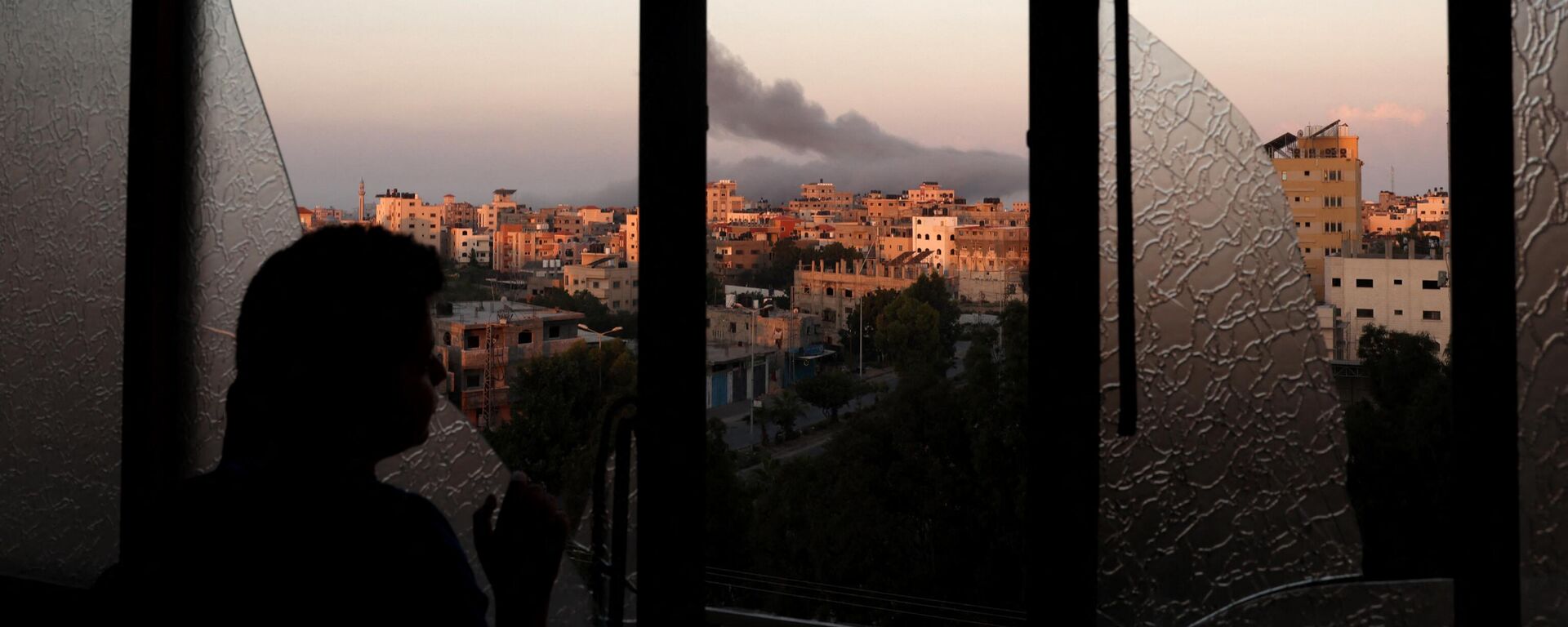https://sputnikglobe.com/20231027/biden-inches-towards-military-disaster-in-middle-east-1114528464.html
Biden Inches Towards Military Disaster in Middle East
Biden Inches Towards Military Disaster in Middle East
Sputnik International
The US has dramatically beefed up its presence in the Middle East, sending two carrier strike groups, thousands of Marines, multiple THAAD and Patriot missile batteries, and more warplanes to the region amid the Palestinian-Israeli flare-up. But these forces can’t guarantee victory in case of a shooting war, says military observer Andrei Martyanov.
2023-10-27T14:13+0000
2023-10-27T14:13+0000
2023-10-27T16:09+0000
hossein amir-abdollahian
lindsey graham
iran
us
israel
hezbollah
marines
thaad
patriot
missile
https://cdn1.img.sputnikglobe.com/img/07e7/0a/10/1114239905_0:111:2425:1475_1920x0_80_0_0_21d8928789bb488b91825f59cbe1a11c.jpg
Tehran issued its strongest warning to Washington to date over the Palestinian-Israeli crisis on Thursday, cautioning that the US wouldn’t be able to escape if the conflict continues unabated.Tehran has so far moderated its response to US and Israeli actions during the Palestinian-Israeli conflict, ignoring efforts by Tel Aviv to goad the country into a military response by attacking Iranian allies in Syria and Lebanon, and snubbing threats by loudmouth officials and lawmakers to bring the war home to "Iran’s backyard.” Instead, Tehran has joined countries such as Russia, China, Brazil, and Turkiye in calling for an immediate ceasefire.Netanyahu cabinet minister Nir Barakat threatened last week to cut off the Iranian “head of the snake” and launch attacks against the Islamic Republic if Hezbollah tried to open a second front against Israel from the north. Meanwhile, US President Joe Biden on Wednesday said he had issued a “warning” to Iran’s supreme leader that if Iran “continue[s] to move against” American troops in the Middle East, the US “will respond, and he should be prepared.”But as observers with an understanding of Iran’s military capabilities observe, tackling Iran would be unlike anything either Israel or the US have ever attempted, with the Islamic Republic’s combination of natural defensive geography, powerful indigenous military-industrial complex, advanced missile and drone programs, and readiness to defend its interests even against much more powerful foes making it an extremely difficult target.US Carriers in Eastern Med ‘Sitting Ducks’ for MissilesThe centerpiece of the US forces deployed to the Middle East amid the Palestinian-Israeli crisis are the USS Gerald Ford and USS Dwight D. Eisenhower carrier strike groups. Each armada theoretically has enough firepower to level a small country, with each carrier carrying a complement of up to 90 combat aircraft, and the giant warships themselves flanked by between four to six cruise missile-equipped destroyers.The armadas are certainly no threat to be taken lightly, but do have important weaknesses when stacked up against countries with modern missile capabilities, transforming into “white elephants” from a bygone era, says veteran military analyst and best-selling author Andrey Martyanov.“In terms of their real power projection,” carriers “are big fat sitting targets against modern weaponry such as anti-ship missiles and hypersonic missiles,” Martyanov told Sputnik’s New Rules podcast.The same can be said even for a mid-tier military power like Iran, given its vast arsenal of thousands of medium and long-range ballistic and cruise missiles, and recent development of a hypersonic missile known as the Fatah. Many of these weapons are theoretically in range of US warships, plus dozens of US bases dotting the Middle East – some of them conveniently just across the Persian Gulf separating Iran from the Arab Gulf oil states.Combined with carriers’ vulnerabilities is their massive cost, Martyanov said, pointing out that the new Ford-class carrier alone costs some $13 billion, plus $5-6 billion for its complement of aircraft.“So you have a single weapon, a single carrier, a single ship, which carries on itself almost $20 billion worth of military assets and could be taken out by two or three missiles such as Zircon or Kinzhal. Can you imagine the impact, apart from the fact of them having a very serious cultural and mental influence within the United States? The loss of a single ship can escalate… to the nuclear threshold because of the political, emotional, cultural and of course military impact of such a loss. Don’t forget, you also have more than 6,000 people on board this carrier,” the observer stressed.Even the Russian-made Yakhont anti-ship missile possessed by Syria – which can reach up to Mach 3 at the terminal stage of flight and has a range of some 300 km, can pose a serious challenge to the American carrier groups, Martyanov said, not to mention the various missiles possessed by Hezbollah – which together force the US to stay further away the region’s coasts.Israeli or US attack on Iran Would Result in Massive RetaliationAsked to comment specifically on Lindsey Graham’s threats against Iran, Martyanov emphasized that the “blowhard” and “certified war criminal” lawmaker “doesn’t know what he’s talking about” when it comes to the consequences of the actions he’s proposing.For one thing, Martyanov said, Graham “doesn’t understand that the United States is not capable” of mounting “any kind of serious ground operation at all” against Iran.The same is the case for Israel, Martyanov noted, with Tel Aviv’s spate of anti-Iranian rhetoric constituting “empty threats,” since the Jewish state lacks the resources to mount a ground operation against Iran even if it were technically feasible.“It would be decimated, but don’t forget, there are 1,200 kilometers separating Israel and Iran. Neither side can actually provide serious deployment of forces to fight a real war,” the observer said, pointing out that neither country would be able take advantage of combined arms multipliers fighting at such great distances.“People forget that Iran has not only good air defense – they have a pretty outstanding variety of all kinds of operational tactical and operational ballistic missiles. And those are not Katyusha [rockets]; they are very serious, highly sophisticated missiles with great targeting. As the United States experienced in 2020, when Donald Trump ordered the absolutely irresponsible assassination of [IRGC Quds Force Commander Qasem] Soleimani,” the military analyst noted, recalling Iran’s bombardment of a pair of US bases in Iraq using precision missiles.“Iran can literally blow up every single American base in the Middle East as a retaliation. So we have these dynamics there. And that’s why, for the most part, these are pathos statements or chest thumping,” Martyanov summed up.
https://sputnikglobe.com/20231026/iran-wont-allow-us-israel-to-scapegoat-tehran-over-gaza-crisis--professor-1114504590.html
https://sputnikglobe.com/20231014/us-sends-2nd-strike-group-with-aircraft-carrier-to-eastern-mediterranean---secretary-1114204950.html
https://sputnikglobe.com/20231026/netanyahu-dragging-us-into-war-with-iran-to-save-his-political-career-security-expert-1114493596.html
iran
israel
Sputnik International
feedback@sputniknews.com
+74956456601
MIA „Rossiya Segodnya“
2023
News
en_EN
Sputnik International
feedback@sputniknews.com
+74956456601
MIA „Rossiya Segodnya“
Sputnik International
feedback@sputniknews.com
+74956456601
MIA „Rossiya Segodnya“
united states, israel, middle east, iran, islamic republic, jewish state, tensions, conflict, crisis, palestine, military, missiles, warship, carrier, strike group, hypersonic, supersonic, ballistic, cruise
united states, israel, middle east, iran, islamic republic, jewish state, tensions, conflict, crisis, palestine, military, missiles, warship, carrier, strike group, hypersonic, supersonic, ballistic, cruise
Biden Inches Towards Military Disaster in Middle East
14:13 GMT 27.10.2023 (Updated: 16:09 GMT 27.10.2023) The US has dramatically beefed up its presence in the Middle East, sending two carrier strike groups, thousands of Marines, multiple THAAD and Patriot missile batteries, and more warplanes to the region amid the Palestinian-Israeli flare-up. But these forces can’t guarantee victory in case of a shooting war, says military observer Andrey Martyanov.
Tehran issued its strongest warning to Washington to date over the Palestinian-Israeli crisis on Thursday, cautioning that the US wouldn’t be able to escape if the conflict continues unabated.
“I say frankly to the American statesmen, who are now managing the genocide in Palestine that we do not welcome [an] expansion of the war in the region,” Iranian Foreign Minister Hossein Amir-Abdollahian
said in New York during an emergency United Nations General Assembly session. America “will not be spared from this fire” if the crisis endures, Amir-Abdollahian emphasized. “It is our home, and West Asia is our region. We do not compromise with any party and any side, and we have no reservation when it comes to our home’s security.”
Tehran has so far moderated its response to US and Israeli actions during the Palestinian-Israeli conflict, ignoring efforts by Tel Aviv to goad the country into a military response by attacking Iranian allies in Syria and Lebanon, and snubbing threats by loudmouth officials and lawmakers to bring the war home to
"Iran’s backyard.” Instead, Tehran has joined countries such as Russia, China, Brazil, and Turkiye in calling for an immediate ceasefire.
Netanyahu cabinet minister Nir Barakat
threatened last week to cut off the Iranian “head of the snake” and launch attacks against the Islamic Republic if Hezbollah tried to open a second front against Israel from the north. Meanwhile, US President Joe Biden on Wednesday said he had issued a “warning” to Iran’s supreme leader that if Iran “continue[s] to move against” American troops in the Middle East, the US “will respond, and he should be prepared.”
But as observers with an understanding of Iran’s military capabilities observe, tackling Iran would be unlike anything either Israel or the US have ever attempted, with the Islamic Republic’s combination of natural defensive geography, powerful indigenous military-industrial complex, advanced missile and drone programs, and readiness to defend its interests even against much more powerful foes making it an extremely difficult target.
US Carriers in Eastern Med ‘Sitting Ducks’ for Missiles
The centerpiece of the US forces deployed to the Middle East amid the Palestinian-Israeli crisis are the USS Gerald Ford and USS Dwight D. Eisenhower carrier strike groups. Each armada theoretically has enough firepower to level a small country, with each carrier carrying a complement of up to 90 combat aircraft, and the giant warships themselves flanked by between four to six cruise missile-equipped destroyers.
The armadas are certainly no threat to be taken lightly, but do have important weaknesses when stacked up against countries with modern missile capabilities, transforming into “white elephants” from a bygone era, says veteran military analyst and
best-selling author Andrey Martyanov.
“In terms of their real power projection,” carriers “are big fat sitting targets against modern weaponry such as anti-ship missiles and hypersonic missiles,” Martyanov told Sputnik’s New Rules podcast.
“In this respect, they are not a real asset, but rather a liability against any major power such as Russia or China,” the observer explained. “In this particular case, those aircraft carriers and their battle groups, which usually comprise two or three ‘Aegis’-carrying destroyers – they are not really any more a serious military asset except for their ‘fear factor’…They could be sunk or basically disabled, and that’s pretty much it,” he said.
The same can be said even for a mid-tier military power like Iran, given its vast arsenal of thousands of medium and long-range ballistic and cruise missiles, and recent development of a hypersonic missile known as the Fatah. Many of these weapons are theoretically in range of US warships, plus dozens of US bases dotting the Middle East – some of them conveniently just across the Persian Gulf separating Iran from the Arab Gulf oil states.
“Iran will be able to deliver both an asymmetric and a very symmetrical” response, Martyanov observed. “Iran has a vast number of highly sophisticated, highly developed ballistic missiles… And they have a vast number of cruise missiles. [The response] can be very symmetrical. And every single air base, military base of the United States will be under attack.”

26 October 2023, 17:00 GMT
Combined with carriers’ vulnerabilities is their massive cost, Martyanov said, pointing out that the new Ford-class carrier alone costs some $13 billion, plus $5-6 billion for its complement of aircraft.
“So you have a single weapon, a single carrier, a single ship, which carries on itself almost $20 billion worth of military assets and could be taken out by two or three missiles such as Zircon or Kinzhal. Can you imagine the impact, apart from the fact of them having a very serious cultural and mental influence within the United States? The loss of a single ship can escalate… to the nuclear threshold because of the political, emotional, cultural and of course military impact of such a loss. Don’t forget, you also have more than 6,000 people on board this carrier,” the observer stressed.
Even the Russian-made Yakhont anti-ship missile possessed by Syria – which can reach up to Mach 3 at the terminal stage of flight and has a range of some 300 km, can pose a serious challenge to the American carrier groups, Martyanov said, not to mention the various missiles possessed by Hezbollah – which together force the US to stay further away the region’s coasts.

14 October 2023, 23:33 GMT
Israeli or US attack on Iran Would Result in Massive Retaliation
Asked to comment specifically on Lindsey Graham’s threats against Iran, Martyanov emphasized that the “blowhard” and “certified war criminal” lawmaker “doesn’t know what he’s talking about” when it comes to the consequences of the actions he’s proposing.
For one thing, Martyanov said, Graham “doesn’t understand that the United States is not capable” of mounting “any kind of serious ground operation at all” against Iran.
“They know if they go in” that they “can send some Tomahawks there. Well, guess what? Iran is not even Syria. Iran is a serious regional power with actually quite significant military potential. And it has some high-tech weapons, including extremely advanced air defense. So in the United States, obviously, those statements are primarily made for the public and for the benefit of Israel, too,” the observer said.
The same is the case for Israel, Martyanov noted, with Tel Aviv’s spate of anti-Iranian rhetoric constituting “empty threats,” since the Jewish state lacks the resources to mount a ground operation against Iran even if it were technically feasible.
“It would be decimated, but don’t forget, there are 1,200 kilometers separating Israel and Iran. Neither side can actually provide serious deployment of forces to fight a real war,” the observer said, pointing out that neither country would be able take advantage of combined arms multipliers fighting at such great distances.
“So what’s left is primarily air operations. And even this, on the part of Israel, will require direct interference and support from the United States because, as already stated, it’s 1,200 kilometers and they would have to fly over the territory of Jordan, Saudi Arabia. Good luck getting permission to do that. Or you can try to circumnavigate them, but then you have to refuel them nonstop. And that’s where the United States comes in,” Martyanov said.

26 October 2023, 15:01 GMT
“People forget that Iran has not only good air defense – they have a pretty outstanding variety of all kinds of operational tactical and operational ballistic missiles. And those are not Katyusha [rockets]; they are very serious, highly sophisticated missiles with great targeting. As the United States experienced in 2020, when Donald Trump ordered the absolutely irresponsible assassination of [IRGC Quds Force Commander Qasem] Soleimani,” the military analyst noted, recalling Iran’s bombardment of a pair of US bases in Iraq using precision missiles.
“Iran can literally blow up every single American base in the Middle East as a retaliation. So we have these dynamics there. And that’s why, for the most part, these are pathos statements or chest thumping,” Martyanov summed up.





